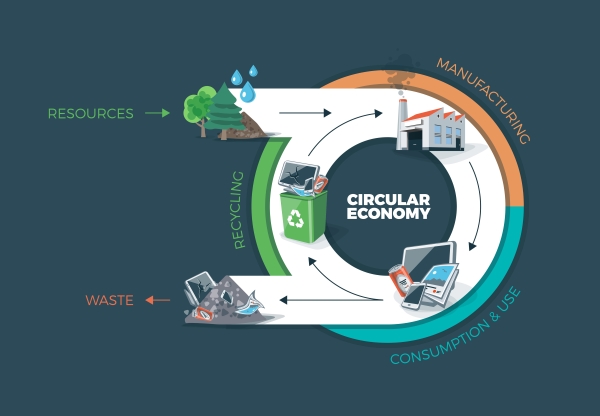
Closed-loop recycling is a sustainable approach that involves collecting, processing, and remanufacturing used materials to create new products while minimising waste and environmental impact. This concept is crucial in promoting circular economy practices, where resources are reused and recycled continuously to reduce the need for virgin materials. By closing the loop, we can reduce the extraction of natural resources, conserve energy, and decrease pollution levels. Embracing closed-loop recycling not only contributes to environmental preservation but also fosters economic growth and social responsibility. It is a fundamental step towards creating a more sustainable and circular economy.
The Process of Closing the Loop
Recycling Your IT Services
Closing the loop in the recycling process begins with Recycling Your IT’s services. This encompasses several aspects, including:
- IT Equipment Recycling– involves dismantling and recovering valuable components from old hardware.
- Secure Data Destruction– guarantees that sensitive information is erased from devices before they are recycled.
- PC Recycling– includes the correct disposal of any additional electronic equipment.
- Office Equipment Recycling Services– covers everything from printers to copiers, ensuring that all parts are either repurposed or disposed of correctly.
- IT Asset Tracking Services– allows companies to monitor their inventory, making sure nothing goes missing during the recycling process.
- Remarketing Service– dispose of your items on a profit-sharing basis.
- Medical Equipment Recycling– ensures redundant data and equipment is dealt with in the best way possible for the client and the environment.
These services are designed to ensure that old or unused IT equipment is collected, refurbished, and reused or recycled responsibly.
Contribution to Closing the Loop
 These services contribute to closing the loop in the recycling process by ensuring that old IT equipment is handled responsibly, reducing electronic waste, and promoting sustainability. For instance, IT equipment recycling prevents hazardous materials from ending up in landfills and allows valuable components to be recovered and reused. Secure data destruction ensures that sensitive information doesn’t fall into the wrong hands, protecting both businesses and individuals. PC recycling extends the life of functional computers, reducing the demand for new devices and the resources required to manufacture them.
These services contribute to closing the loop in the recycling process by ensuring that old IT equipment is handled responsibly, reducing electronic waste, and promoting sustainability. For instance, IT equipment recycling prevents hazardous materials from ending up in landfills and allows valuable components to be recovered and reused. Secure data destruction ensures that sensitive information doesn’t fall into the wrong hands, protecting both businesses and individuals. PC recycling extends the life of functional computers, reducing the demand for new devices and the resources required to manufacture them.
Office equipment recycling services, IT asset tracking services, and remarketing services work together to ensure that every part of an organisation’s IT infrastructure is accounted for and properly recycled. Medical equipment recycling and WEEE recycling broaden the impact of responsible recycling practices, addressing the environmental concerns associated with discarded electronics. By choosing to recycle their IT services, businesses can significantly shrink their carbon footprint and contribute to a more circular economy.
Benefits of Closed-Loop Recycling
 Closed-loop recycling offers numerous benefits across various domains. Environmentally, it reduces the amount of waste sent to landfills and incinerators, thereby decreasing greenhouse gas emissions, and conserving natural resources. The recycling process also consumes less energy and water compared to producing new products from raw materials. Economically, closed-loop recycling creates jobs and stimulates economic growth while reducing the costs associated with extracting, processing, and transporting raw materials. It also increases the competitiveness of businesses that adopt sustainable practices, as consumers increasingly prefer environmentally responsible products and services.
Closed-loop recycling offers numerous benefits across various domains. Environmentally, it reduces the amount of waste sent to landfills and incinerators, thereby decreasing greenhouse gas emissions, and conserving natural resources. The recycling process also consumes less energy and water compared to producing new products from raw materials. Economically, closed-loop recycling creates jobs and stimulates economic growth while reducing the costs associated with extracting, processing, and transporting raw materials. It also increases the competitiveness of businesses that adopt sustainable practices, as consumers increasingly prefer environmentally responsible products and services.
Socially, closed-loop recycling fosters a culture of sustainability and community engagement, raising awareness about the importance of resource conservation and proper waste management. Resource conservation is another significant advantage of closed-loop recycling, as it prolongs the life of landfills and reduces the need for extracting and processing raw materials. Finally, reduction of waste is a direct result of closed-loop recycling, as it encourages the reuse and repair of products, ultimately minimising the amount of waste generated. Overall, implementing closed-loop recycling practices has numerous advantages that benefit the environment, society, and the economy.
In summary, closed-loop recycling is a fundamental step towards creating a sustainable and circular economy by promoting the reuse and recycling of materials to minimise waste and environmental impact. By embracing closed-loop recycling practices, we can reduce the extraction of natural resources, conserve energy, and decrease pollution levels. This approach not only contributes to environmental preservation but also fosters economic growth and social responsibility.
